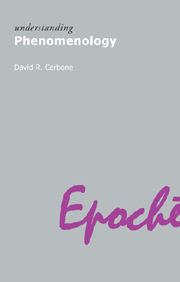
-
The digital format of this book is no longer available to purchase from Cambridge Core. Other formats may be available.
-
Select format
-
- Publisher:
- Acumen Publishing
- Publication date:
- 05 February 2013
- 30 May 2006
- ISBN:
- 9781844653737
- 9781844650545
- 9781844650552
- Dimensions:
- Weight & Pages:
- 00kg,
- Dimensions:
- Weight & Pages:
- 00kg,
- Subjects:
- Philosophy: General Interest, Philosophy
You may already have access via personal or institutional login- Subjects:
- Philosophy: General Interest, Philosophy
Book description
Understanding Phenomenology provides a concise and accessible guide to one of the most important schools of thought in modern philosophy. The book traces phenomenology's historical development, beginning with its founder, Edmund Husserl and his "pure" or "transcendental" phenomenology, and continuing with the later, "existential" phenomenology of Heidegger, Sartre and Merleau-Ponty. Each chapter provides an expert distillation of each philosopher's refinements to the movement's core ideas and provides readers with a clear picture of how phenomenology moved from primarily a theory of knowledge to a new philosophical method. The final chapter assesses later, critical responses to phenomenology ranging from Derrida to Dennett and reflects on the continued significance of phenomenology for philosophy today. Written for those coming to phenomenology for the first time, Understanding Phenomenology guides the reader through the often bewildering array of technical concepts and jargon, and provides clear explanations and helpful examples to encourage and enhance engagement with the primary texts. It is ideally suited for courses in twentieth-century continental philosophy and for the non-specialist looking for an authoritative overview.
Reviews
"Understanding Phenomenology strikes a masterful balance in tone and content, combining accessibility and sophistication, generality and subtlety, exposition and criticism. It is a superb text; the best introduction to phenomenology available in English."
Taylor Carman
Contents
Metrics
Altmetric attention score
Full text views
Full text views help Loading metrics...
Loading metrics...
* Views captured on Cambridge Core between #date#. This data will be updated every 24 hours.
Usage data cannot currently be displayed.
Accessibility standard: Unknown
Why this information is here
This section outlines the accessibility features of this content - including support for screen readers, full keyboard navigation and high-contrast display options. This may not be relevant for you.
Accessibility Information
Accessibility compliance for the PDF of this book is currently unknown and may be updated in the future.


